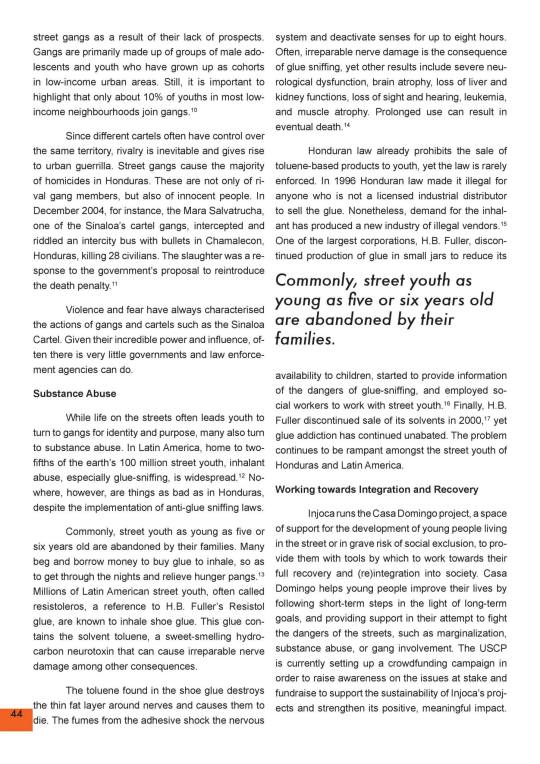Text
LIVE ON INDIEGOGO!!
We would hereby like to inform you that we have launched the our Crowdfunding campaign on IndieGoGo. Through our IndieGoGo campaign we hope to raise money to reopen the doors of the Casa Domingo home for marginalised Honduran youth. Our goal is to raise €4500,- in 40 days, We have until May 26th 2015. We would like to invite you to help our cause by sharing & visiting our campaign and helping us raise money via the crowdfunding portal IndieGoGo. Visit our IndieGoGo campaign here!
1 note
·
View note
Photo



We look forward to seeing you on April 14th and sharing our work with you!
0 notes
Photo
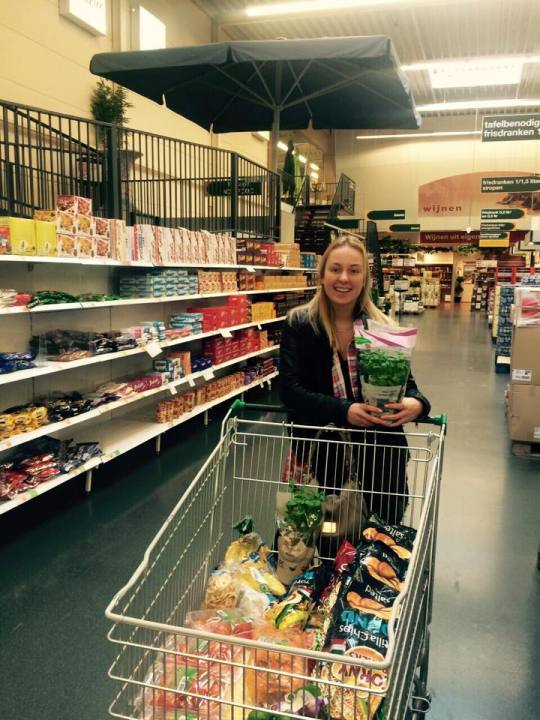

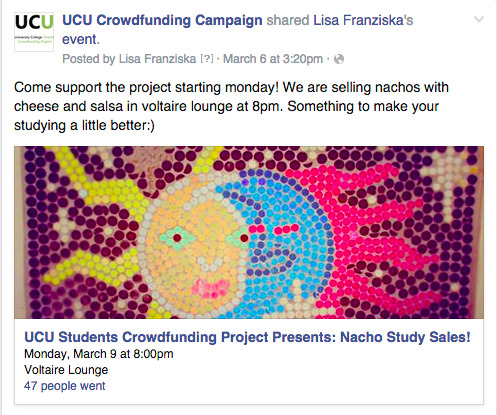

Last week we had our first promotional event to raise money and awareness for our upcoming campaign. Thanks to all of the support we were able to sell nachos while as a study break during mid-terms. We spoke to many of our fellow students giving them an update on all of the work we have been doing. Thank you to all of the supporters! Can’t wait to show everyone the movie and launch the campaign very soon!
0 notes
Photo

The difficulty in changing the world
I think it is safe to say that volunteer work andfundraising enjoy a much-idealised reputation. We often imagine stints inIndian orphanages or building schools around Africa to be more than just résumé-fillers, but actually as meaningful, life changing and ever-lasting. The reality, however, seems to be a little different. While it is clear that trips of this sort are without a doubt impacting, I think it is safe to say that volunteer work internationally is far from easy and will most likely leave you feeling somewhat frustrated and confused at one point or another.
While I was aware of this before going to Honduras after a few previous volunteering and fundraising experiences, I was faced with a series of frustrating situations in which I felt like not only my work, but anyone’s efforts in Tegucigalpa were overshadowed by layers of bureaucracy, corruption and barriers. Injoca, for instance, has been promised funding by the government but has been waiting for it since August. When we visited the appropriate office, we were sent away because the responsible person was unavailable. By now, two weeks later, Injoca has finally had the amount of money confirmed, but has not been promised a date to receive this funding, which the organisation so desperately needs.
Honduras ranks 126th out of 175 in transparency.org’s corruption index, with a score of only 29 out of 100. It is therefore not surprising that it is easy to become overwhelmed with the inequality in the amount of good intentions and hard work being done by NGO’s and volunteers in places such as Tegucigalpa compared to the even bigger amount of corruption and bureaucracy, which often negates any effort to improve the situation.
A Thai saying that often came to mind during our time in Tegucigalpa was “sabay sabay” (forgive my spelling...), which more or less translates into “don’t worry, it will be okay” and is used in the countless situations where things take longer than expected. I caught myself thinking “sabay sabay” during the numerous times spent waiting in Honduras. While frustrating, waiting for things to be done is essentially unavoidable. Sabay sabay…
The governmental organization and administration is clearly a major obstacle to developmental work in Tegucigalpa; if they weren’t, there most likely would not be a need for any NGO work. Nonetheless, the work with youth, no matter where in the world, can also come with its difficulties. As emphasised by Injoca, the young men who know little more than the street need infinite, rather than second or third chances. Many street youth grow up thinking in terms of their day-to-day survival rather than how they will fare in the long run. As a result, their behaviour can turn out to be disappointing at times. What is important to remember is that these youth expect abandonment and are driven by the instinct of day-to-day survival. It is easy to imagine why it can be incredibly difficult to work with street youth. Not only have many of them suffered from problems such as drug use, organised crime and gang violence, they are often also suspicious of adults the authorities. Many of their relationships with adults have been exploitative or violent and thus many can be untrusting or unwilling and generally facing multifaceted social issues. But because of these infinite chances, I was able to meet boys who have truly turned their lives around as a result of organisations like Casa Domingo.
In this sense, I think it is important to be prepared for the challenges and culture shock that comes with fundraising and volunteering abroad. This should, however, by no means prevent anyone from trips of this sort. The benefits of these experiences are endless; travelling, learning a new language and meeting new people, working to improve the lives of community, broadening horizons… I could go on for pages.
0 notes
Text
Update #2! The Juan Pablo II Centre
Last Friday we went to El Paraiso, a small town not far from Tegucigalpa. We visited the Juan Pablo II detox centre run by Nico Parasmo, an Italian educator who has lived in Honduras for more than 5 years. The peculiarity of the rehabilitation centre is that it is the only free working centre in Honduras, and it can host a maximum of 8 patients for a 1 year program. Juan Pablo II is funded partially by the Church, private investors and the Honduran government, however Nico is aiming to make the centre totally self-sustainable, by selling coffee and beans grown by the people working there. The typical routine of every patient starts at 6am, the first hour of the day is dedicated to having breakfast and exercise. In the morning each patient has a specific task to do: fertilize and cultivating the soil, watering plants, taking care of the centre, cleaning or cooking. The lunch is at midday, the boys work until 3pm, and then they have free time to read, watch television, play football or just chill together. Rules might seem incredibly strict but this is necessary to make the centre extremely efficient. The success rate of Juan Pablo II is 4 times higher than every other detox centre in Italy (2% against 8%). Nico has done a great job so far helping youth in Honduras and we are sure he will keep it up in the future! A few of the boys from Casa Domingo have been rehabilitated by the centre and its success and efficiency have greatly inspired Andrea and the Casa Domingo project.
0 notes
Photo

Greetings from Tegucigalpa!
We have been really busy in the past few days settling in and getting to know Tegucigalpa, Casa Domingo and the boys at the project. Tegucigalpa is an incredibly vibrant and busy city, with street vendors, honking cars and lots of people in the streets. We visited the Casa Domingo house on our first day in Tegucigalpa where Andrea, the project leader and coordinator, explained the current situation in both Tegucigalpa and the project to us. With its culture of violence, drug trade and gang dominance, Honduras has become a country where societal support systems are lacking. Tegucigalpa faces the increasing presence of street youth due to an incredibly unequal society where drugs and violence have caused the people, and youth in particular, who are most vulnerable in society to get lost in the system. While there are quite a few projects and NGOs in Tegucigalpa working with people living in the streets (for instance Breaking Chains or Casa Alianza), Casa Domingo is one of the few, if even the only, that supports youth between the ages of 18 and 23. Casa Domingo gives these youth a space to create independent lives separate from the street, the violence, the drugs and the gangs. As part of the project Casa Domingo has a house with room for ten boys as a halfway house in the process of establishing their own healthy way of life. At the moment, however, Casa Domingo has had to close its doors for the time being and is only focusing on its work with the youth in a street setting. Due to a lack of funds (for instance due to spending cuts by the Spanish government, who was once the project's primary donor) Casa Domingo can no longer afford to house youth, thus strongly compromising its abilities. Andrea has introduced us to many boys whom she works with, and often ends introductions with and expression of her desire to have them living in the house to offer them an alternative to a life in the streets. It's heartbreaking to see how many young people could benefit from a project like Casa Domingo but do not have to opportunities due to a lack of funds. #ucucrowdfunding #casadomingo #injoca
0 notes
Video
youtube
An insight into the reality of life on the streets of San Pedro Sula. Viewer discretion advised...
0 notes
Video
youtube
In Spanish only (apologies)
La Asociación Integración de Jóvenes en Situación de Calle, INJOCA, presenta su nuevo vídeo.
Una producción llena de vivencias, sensaciones, y testimonios de gente que participa y colabora activamente, que ha estado en el Proyecto Casa Domingo de Tegucigalpa, Honduras dando todo lo posible por que el Proyecto siga adelante.
Además los testimonios de algunos de los jóvenes que afortunadamente han podido conocer el Proyecto y salir adelante gracias al apoyo que se les ofreció y su fortaleza para saber mirar adelante, proponerse retos y sobretodo, llegar a cumplirlos algún día.
Gracias a los jóvenes que han pasado por Casa Domingo, a todos y todas y cada uno/a de los que ha hecho que cada día nos levantemos con más fuerza, jóvenes que saben lo que cuesta salir adelante, pero que no cesan en su empeño de conseguir sus sueños e ilusiones. A todos ustedes, GRACIAS.
0 notes
Text
THE PROJECT: CASA DOMINGO
THE "CASA DOMINGO" PROJECT: An Alternative to the Street
Casa Domingo is a space of support for the entire development of young people living in the street or in social risk.
Casa Domingo helps youth in the improvement of their own lives by following their steps and giving them support in their future projects. Casa Domingo operates as a home, a day center, and a support network in the streets.
It is a dynamic project where the youngsters are the main characters. Each one of them must find his space, establish his own rhythm and decide on his progress, looking to satisfy his needs and acknowledge his role as a citizen. The individual is the base of everything.

YOUTH SUPPORT IN TEGUCIGALPA:
There are three key reasons for youth leaving their homes:
- Poverty creates instability in the family and pushes the parents to send their children to work or look for money as a need to sustain the family. This is the main reason why youth often cannot access education and become illiterate.
- The high level of poverty often leads to instability within families and children often feel lonely and look for alternative lives in the street. They find an apparent freedom and security among their friends, and often use drugs as a means to escape.
- Along with poverty and instability, children often grow up in very violent circumstances.

Difficulties:
- Violence: among youth, institutional (police) and from third parties (gangs, the society in general, etc.).
- Drug addiction: very common among children and youngsters who live in the street. Drugs are taken both individually and as a group, and mostly combining different substances (marihuana, crack and inhaled substances).
- Survival in the streets: young people adapt themselves to the street code, where drug dealing and consumption, robbery and prostitution are common. At the same time, everything in this group is shared and there is a strong solidarity force in dangerous situations.

Social Response:
The response is clearly insufficient as the institutional protection does not exist and there are no measures which favor the socialisation and integration of street youth into society. Essentially, these youth are exploited, as they provide drugs, and participate in criminal jobs and sexual operations (police, prostitution network, gangs) with little government or insitutional interference.
CIVIL, GOVERNMENTAL, NATIONAL AND FOREIGN SUPPORT:
Government Assistance:
IHNFA (Honduran Institute for children and family): residential centers for minors until 18. Offer programs for minors searching alternative measurements to imprisonment. Lack of professionalization and limited means. It works with all "meta groups".
Pedagogic Centre RENACIENDO: Centre for minors confinement. They work periodically for the remission of young people with changes in the legal measures, in agreement with the court for minors.
Civil:
MÉDICOS SIN FRONTERAS (Doctors Without Borders): Work with the youth of the streets and offer medical care and work on the streets battling the extreme violence in paticular.
CASA ASTI: Work with minors living on the streets by means of a day center offering professional education and assistance. Limited capacity to attend young people in terms of space and opening hours.
CASA ALIANZA: Residential House for minors of different ages until 18. They work with minors who live in the street, in social risk.
CASA BELÉN: Social canteen, medical center, day center working with people who live in the street and with social risk
BREAKING CHAINS. Night shelter for teenagers and young people who live in the street.
MISIONEROS DE LA CALLE: Rehabilitation and treatment of population with drug problems.
The Need for Casa Domingo:
The centers responsible for the rehabilitation of street youth are not enough and are too overcrowded. There is no "halfway house" for these young people and thus these organisations fail to achieve the rehabilitation of the youth. As a result of recent studies by local institutions it is clear that these young people have few means toescape the cycle of poverty and street life. Thus, Casa Domingo was born with the purpose of accompanying and helping these young people in the search of their own objectives.
Institutional Coordination:
A coordinated and planned work with the different institutions is something essential for a real educational work.
INJOCA works in close cooperation with :
RED ( institutions which work with people who live in the street)
COIPRODEN (network working for children and youth; 40 associations are part of it)
Other public or private institutions like hospitals, health centers, schools,detoxification clinics, prisons...
PROJECT OBJECTIVES
General Objective: Improve life conditions of people suffering social isolation in Honduras.

Specific Objectives: complete support and individual "mentoring" for all young people living in the street in their socialisation and reintegration processes.
MAIN WORK AND OBJECTIVES:

Presence in the streets:
The social workers and educators work in the street, getting in touch with the reality of street youth, aiming to communicate with them, work with them, organize day trips and try to create trust with these young people to pinpoint the needs and reality of the youth.
2 monthly in situ studies in the key neighborhoods (night and day visitations)
Close contact with youth
Introduction of games and workshops
Follow-up of individual cases
Brief report about the activities carried out
Residential Home:

Young people live at the Casa Domingo residential home with a team of educators to learn the means and routines for their future independence and social reinsertion.
Organization and performance of all typical home tasks like cleaning, cooking, shopping and so on.
Responsibility of specific individual objectives (work, savings, detoxification, habits, timetables...)
Contact with families
Assistance and participation in a general meeting
Recreational, sport and educational activities
Micro credits
Working Towards Youth Independence:
Youth receive help from different groups for common support, routine visits and also school grants.
There is a scholarship programme for young people with social risk offering scholarships in general education and professional training.
Visits to educational centers and contact with families.
TARGET POPULATION:
The target population can be divided in two groups:
Population based in the street,the great majority of which uses drugs such as inhalants, marihuana and crack.
Population under social risk: Young people, who come from centers for minors find themselves abandoned and helplessness.
The residential project has the capacity to deal with only 10 men, aged from 16 to 30. The goal is to offer quality, personalized attention to each one of them, in order to help them become independent. Therefore the project pretends to act as a bridge or a halfway house in the process. The youth stay in the residence is from six months to a year.
The independent life program attends to the youth and their families, and supports them until they reach independence. This process usually takes up to two years.
0 notes
Photo
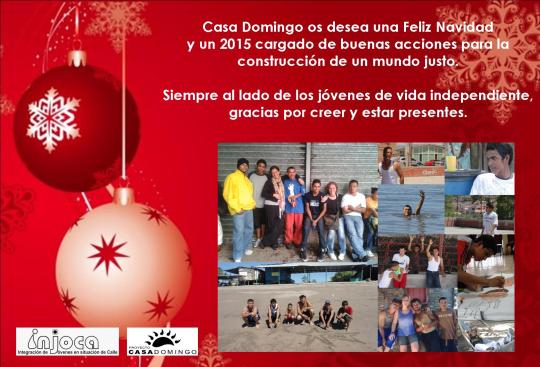
Casa Domingo & INJOCA wish you a merry christmas & Happy New Year
0 notes
Text
THE ORGANISATION: INJOCA
INJOCA: Encouraging the right to a decent life

INJOCA is a nonprofit private organization which operates under the principles of religious, political and ethnical neutrality, respecting the human rights and social and economic fairness.
INJOCA’s aim is to carry out projects based on humanitarian aid to the children and youth of a country, particularly in the most isolated areas. These projects want to create and develop appropriate living conditions in terms of peace, justice, rights, solidarity and integral development of the individual, in the most deprived areas of the population. Such activity will be performed in Honduras with the support national and international governmental institutions, as well as non-governmental entities.
INJOCA furthermore aims;
To offer new opportunities to young people living in the street or in social risk.
To encourage a better education among people attended in the different projects.
INJOCA has developed the "Casa Domingo" project in Tegucigalpa, with the purpose to continue operating among the people living in the street and under conditions of social risk.
0 notes
Text
About US

The UCU Crowdfunding Campaign aims to promote grassroots development by raising funds for INJOCA, an NGO that works with marginalised youth in Honduras.
We are three students at the honours college of Utrecht University in the Netherlands and will be working with INJOCA in Tegucigalpa in order to raise awareness and funds to help empower excluded Honduran youth to lead independent lives separate from the streets.
The campaign will be launched in January 2014 and will aim to raise funds to sustain the meaningful, community-based work of INJOCA

Name: Lisa
Age: 21
Nationality: German
Studies: International Relations & Development, History (Minor)
In my spare time you’ll find me: taking/editing/looking at photos, traveling (or thinking about traveling), involved in a variety of social projects
I grew up exposed to a variety of cultures, languages, values and opinions - something I pinpoint as the reason I am a very open and socially involved person. What drew all of us to crowdfunding was the power of alternative structures. Local development at a grassroots level, made possible through initiatives like crowdfuding, is realistic and manageable. We are taking real-life needs and approaching them with rational goals. My interest in Injoca was really a no-brainer. We are three young people in privileged situations and the project’s focus on youth obviously hits home. I think the relatability to the project and the youth was what essentially made all three of us passionate about making this project a reality and more importantly successful.
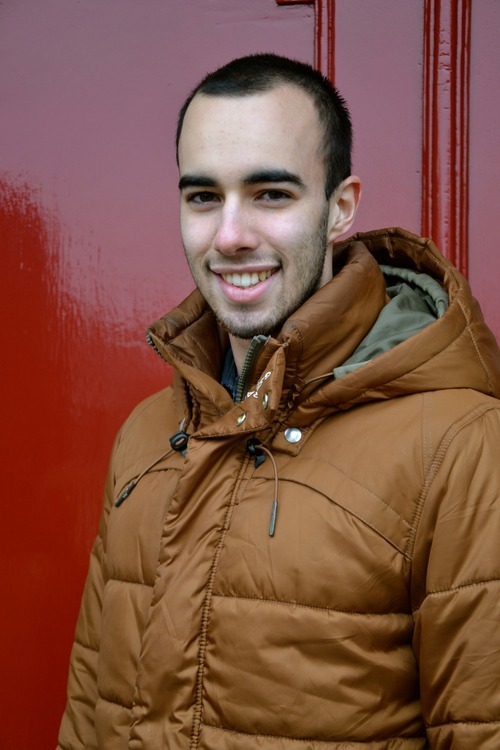
Name: Ben
Age: 20
Nationality: Italian
Studies: Development & Sociology, Statistics (Minor)
In my spare time you’ll find me: filming and editing videos, traveling
The UCU Crowdfunding Project is an invaluable opportunity for me to receive training, employ my learning and do field research. I am looking forward to experiencing everyday life in a developing country meeting new people, collaborating and exchanging ideas with them to reach a common goal. I will mainly contribute to the program with my videography skills since I have already worked on various video project in my previous years at UCU. I like producing video content because it helps to tell stories in a powerful way, and this is what I ultimately want to achieve through my technical expertise, communication skills and creative eye.

Name: Linda
Age: 18
Nationality: Dutch-Guinean
Studies: Law, Anthropology & International Relations, Philosophy (minor) In my spare time you’ll find me: dancing, playing hockey, travelling and taking pictures
I was born in a developing country and raised in The Netherlands. As I result I developed an interest for international matters and a passion for human rights at a young age. As a member of several youth organisations I have seen the power of our generation and am aware of the role we can play in standing up against the marginalization of youth. The fact that INJOCA focuses on marginalized youth is what makes me eager to contribute to this project the most. Furthermore, I am happy that we get to do this through a means that assists the organization financially and allows the organization to continue the work they do. All three of us are great advocates of the grassroots development movement.
0 notes


